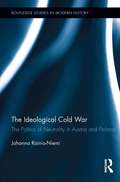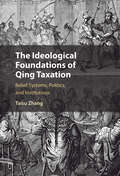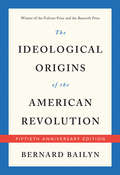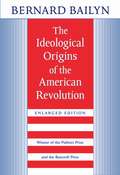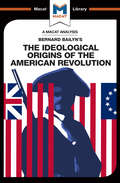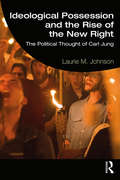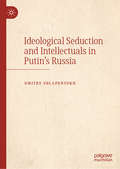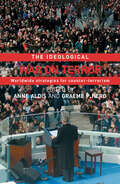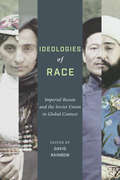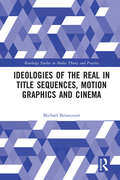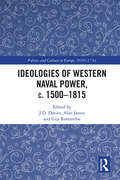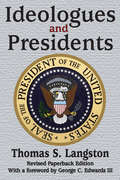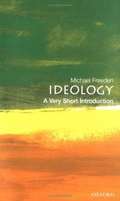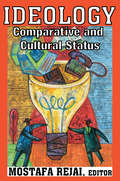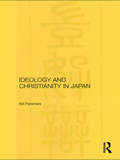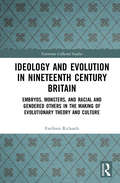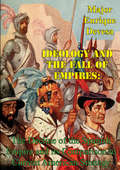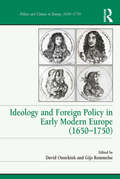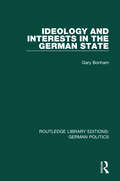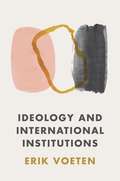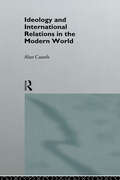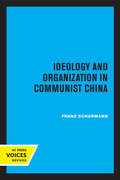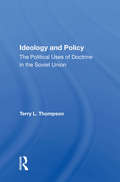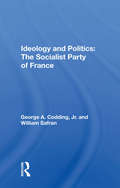- Table View
- List View
The Ideological Cold War: The Politics of Neutrality in Austria and Finland (Routledge Studies in Modern History #12)
by Johanna Rainio-NiemiThis book opens new perspectives into the Cold War ideological confrontations. Using Austria and Finland as an example, it shows how the Cold War battles for the hearts and minds of the people also influenced policies in countries that wished to stay outside the conflict. Following the model of older European neutrals, Austria and Finland sought to combine neutrality with democracy. The combination was eagerly challenged by ideological Cold Warriors on both sides of the divide and questioned at home too. Was neutrality risking the neutrals’ commitment to democracy, or did the commitment to the western type of democracy threaten their commitment to neutrality? Confronting these doubts grew into an organic part of practicing neutrality in the Cold War world. The neutrals needed to be exceptionally clear regarding the ideological foundations of their neutrality. Successful neutrality required a great deal of conceptual consistence and domestic unanimity. None of this was pre-given in Austria or Finland. However, in the model of Switzerland and Sweden, (armed) neutrality was systematically integrated with the official state ideology and promoted as a part of national identity. Legacies of these policies outlived the end of the Cold War.
The Ideological Foundations of Qing Taxation: Belief Systems, Politics, and Institutions (Cambridge Studies in Economics, Choice, and Society)
by Taisu ZhangHow states develop the capacity to tax is a question of fundamental importance to political science, legal theory, economics, sociology, and history. Increasingly, scholars believe that China's relative economic decline in the 18th and 19th centuries was related to its weak fiscal institutions and limited revenue. This book argues that this fiscal weakness was fundamentally ideological in nature. Belief systems created through a confluence of traditional political ethics and the trauma of dynastic change imposed unusually deep and powerful constraints on fiscal policymaking and institutions throughout the final 250 years of China's imperial history. Through the Qing example, this book combs through several interaction dynamics between state institutions and ideologies. The latter shapes the former, but the former can also significantly reinforce the political durability of the latter. In addition to its historical analysis of ideological politics, this book makes a major contribution to the longstanding debate on Sino-European divergence.
The Ideological Origins of the American Revolution: Fiftieth Anniversary Edition
by Bernard BailynThe Ideological Origins of the American Revolution is a classic of American historical literature—required reading for understanding the Founders’ ideas and their struggles to implement them. In the preface to this 50th anniversary edition, Bernard Bailyn isolates the Founders’ profound concern with the uses and misuses of power.
The Ideological Origins of the American Revolution
by Bernard BailynIn this book, Bailyn discusses the intense, nation-wide debate on the ratification of the Constitution, stressing the continuities between that struggle over the foundations of the national government and the original principles of the Revolution.<P><P> Pulitzer Prize Winner
The Ideological Origins of the American Revolution
by Etienne Stockland Joshua SpechtHistorians of the American Revolution had always seen the struggle for independence either as a conflict sparked by heavyweight ideology, or as a war between opposing social groups acting out of self-interest. In The Ideological Origins of the American Revolution, Bernard Bailyn begged to differ, re-examining familiar evidence to establish new connections that in turn allowed him to generate fresh explanations. His influential reconceptualizing of the underlying reasons for America's independence drive focused instead on pamphleteering – and specifically on the actions of an influential group of ‘conspirators’ who identified, and were determined to protect, a particularly American set of values. For Bailyn, these ideas could indeed be traced back to the ferment of the English Civil War – stemming from radical pamphleteers whose anti-authoritarian ideas crossed the Atlantic and embedded themselves in colonial ideology. Bailyn's thesis helps to explain the Revolution's success by pointing out how deep-rooted its founding ideas were; the Founding Fathers may have been reading Locke, but the men they led were inspired by shorter, pithier and altogether far more radical works. Only by understanding this, Bailyn argues, can we understand the passion and determination that allowed the rebel American states to defeat a global superpower.
Ideological Possession and the Rise of the New Right: The Political Thought of Carl Jung
by Laurie M. JohnsonPolitical theorist Laurie M. Johnson deals with Jung’s analysis of the effects of modern scientific rationalism on the development of communism, fascism and Nazism in the 20th century and applies this analysis to the rise of the New Right in the 21st century. Jung’s thought provides much needed insight into contemporary ideologies such as neoliberalism, Identitarianism and the Alt-Right. Johnson explains Jungian analytical psychology as it relates to these topics, with a chapter devoted to Jung’s views of Friedrich Nietzsche, who exemplifies the modern problem with his proclamation that God is dead, and an in-depth discussion of Jung’s views on truth and the psychological function of religion as a safeguard against deadly mass movements. She then turns to Jung’s treatment of anti-Semitism and the Nazi movement, and his views on race and racism. Johnson applies these historical insights to the current manifestations of mass psychological disruption in the clash between neoliberals and the right-wing populist and Identitarian movements on the rise in North America and Europe. She concludes by discussing the search for an authentic and meaningful life in a West that rejects extremism and is open to authentic spiritual experiences as a counterbalance to mass mindedness. Ideological Possession and the Rise of the New Right will appeal to both undergraduate and graduate students of psychology and intellectual history. The book will also be of interest to those wishing to understand the new nationalist, nativist and Identarian movements.
Ideological Seduction and Intellectuals in Putin's Russia
by Dmitry ShlapentokhThis book examines the interplay between key rulers and intellectuals in creating and sustaining popular discourses that often help keep rulers in power. By focusing in particular on the relationship between Putin and Dugin during the early Putin regime, the author zooms in on the questionable honesty in Putin's interest in Dugin's philosophy, and the instrumentality of that philosophy for strategic regime building. Arguing that ideology is largely supported by political philosophies that gain popular traction, the book questions the extent to which rulers are likely to stay faithful to their stated ideologies. Providing on-the-ground insight into Putin's rule, this book appeals to researchers and policymakers studying Post-Soviet Politics.
The Ideological War on Terror: Worldwide Strategies For Counter-Terrorism (Political Violence)
by Graeme P. Herd Anne AldisThis edited book addresses the appropriateness of US and other counter-terrorist (CT) strategies in Europe and Eurasia, the Middle East, the Asia Pacific region and in Latin America, with a view to improving their effectiveness. The book has three main objectives: to re-examine terrorists' strategic goals and sources of legitimacy and the nature of their ideological support to analyze current US and regional CT strategies and assess their success in de-legitimizing terrorists and undermining their support to provide a strategic synthesis and policy recommendations in light of the research findings. This book will be of interest to students of political violence and terrorism, security studies and international relations in general.
Ideologies of Race: Imperial Russia and the Soviet Union in Global Context
by David RainbowIs the concept of "race" applicable to Russia and the Soviet Union? Citing the idea of Russian exceptionalism, many would argue that in the nineteenth and twentieth centuries, while nationalities mattered, race did not. Others insist that race mattered no less in Russia than it did for European neighbours and countries overseas. These conflicting notions have made it difficult to understand rising racial tensions in Russian and Eurasian societies in recent years. A collection of new studies that reevaluate the meaning of race in Russia and the Soviet Union, Ideologies of Race brings together historians, literary scholars, and anthropologists of Russia, the Soviet Union, Western Europe, the United States, the Caribbean, and Latin America. The essays shift the principle question from whether race meant the same thing in the region as it did in the "classic" racialized regimes such as Nazi Germany and the United States, to how race worked in Russia and the Soviet Union during various periods in time. Approaching race as an ideology, this book illuminates the complicated and sometimes contradictory intersection between ideas about race and racializing practices. An essential reminder of the tensions and biases that have had a direct and lasting impact on Russia, Ideologies of Race yields crucial insights into the global history of race and its ongoing effects in the contemporary world. Contributors include Adrienne Edgar (University of California, Santa Barbara), Aisha Khan (New York University), Alaina Lemon (University of Michigan), Susanna Soojung Lim (University of Oregon), Marina Mogilner (University of Illinois, Chicago), Brigid O'Keeffe (Brooklyn College), David Rainbow (University of Houston), Gunja SenGupta (Brooklyn College), Vera Tolz (University of Manchester), Anika Walke (Washington University, St. Louis), Barbara Weinstein (New York University), and Eric Weitz (City University of New York).
Ideologies of Race: Imperial Russia and the Soviet Union in Global Context
by David RainbowIs the concept of "race" applicable to Russia and the Soviet Union? Citing the idea of Russian exceptionalism, many would argue that in the nineteenth and twentieth centuries, while nationalities mattered, race did not. Others insist that race mattered no less in Russia than it did for European neighbours and countries overseas. These conflicting notions have made it difficult to understand rising racial tensions in Russian and Eurasian societies in recent years. A collection of new studies that reevaluate the meaning of race in Russia and the Soviet Union, Ideologies of Race brings together historians, literary scholars, and anthropologists of Russia, the Soviet Union, Western Europe, the United States, the Caribbean, and Latin America. The essays shift the principle question from whether race meant the same thing in the region as it did in the "classic" racialized regimes such as Nazi Germany and the United States, to how race worked in Russia and the Soviet Union during various periods in time. Approaching race as an ideology, this book illuminates the complicated and sometimes contradictory intersection between ideas about race and racializing practices. An essential reminder of the tensions and biases that have had a direct and lasting impact on Russia, Ideologies of Race yields crucial insights into the global history of race and its ongoing effects in the contemporary world. Contributors include Adrienne Edgar (University of California, Santa Barbara), Aisha Khan (New York University), Alaina Lemon (University of Michigan), Susanna Soojung Lim (University of Oregon), Marina Mogilner (University of Illinois, Chicago), Brigid O'Keeffe (Brooklyn College), David Rainbow (University of Houston), Gunja SenGupta (Brooklyn College), Vera Tolz (University of Manchester), Anika Walke (Washington University, St. Louis), Barbara Weinstein (New York University), and Eric Weitz (City University of New York).
Ideologies of the Real in Title Sequences, Motion Graphics and Cinema (Routledge Studies in Media Theory and Practice)
by Michael BetancourtThis book explores the question of realism in motion pictures. Specifically, it explores how understanding the role of realism in the history of title sequences in film can illuminate discussions raised by the advent of digital cinema. Ideologies of the Real in Title Sequences, Motion Graphics and Cinema fills a critical and theoretical void in the existing literature on motion graphics. Developed from careful analysis of André Bazin, Stanley Cavell, and Giles Deleuze’s approaches to cinematic realism, this analysis uses title sequences to engage the interface between narrative and non-narrative media to consider cinematic realism in depth through highly detailed close readings of the title sequences for Bullitt (1968), Kolchak: The Night Stalker (1974), The Number 23 (2007), The Kingdom (2008), Blade Runner: 2049 (2017) and the James Bond films. From this critique, author Michael Betancourt develops a modal approach to cinematic realism where ontology is irrelevant to indexicality. His analysis shows the continuity between historical analogue film and contemporary digital motion pictures by developing a framework for rethinking how realism shapes interpretation.
Ideologies of Western Naval Power, c. 1500-1815 (Politics and Culture in Europe, 1650-1750)
by J. D. Davies Alan James Gijs RommelseThis ground-breaking book provides the first study of naval ideology, defined as the mass of cultural ideas and shared perspectives that, for early modern states and belief systems, justified the creation and use of naval forces. Sixteen scholars examine a wide range of themes over a wide time period and broad geographical range, embracing Britain, the Netherlands, France, Spain, Sweden, Russia, Venice and the United States, along with the "extra-national" polities of piracy, neutrality, and international Calvinism. This volume provides important and often provocative new insights into both the growth of western naval power and important elements of political, cultural and religious history.
Ideologues and Presidents (American Presidents Ser.)
by Thomas S. LangstonIdeologues and Presidents argues that ideologues have been gaining influence in the modern presidency. There were plenty of ideologues in the New Deal, but they worked at cross purposes and could not count on the backing of the cagey pragmatist in the Oval Office. Three decades later, the Johnson White House systematically sought the help of hundreds of liberals in drawing up blueprints for policy changes. But when it came time to implement their plans, Lyndon Johnson's White House proved to have scant interest in ideological purity.By the time of the Reagan Revolution, the organizations that supported ideological assaults on government had never been stronger. The result was a level of ideological influence unmatched until the George W. Bush presidency. In Bush's administration, not only did anti-statists and social conservatives take up positions of influence throughout the government, but the president famously pursued an elective war that had been promoted for a decade by a networked band of ideologues.In the Barack Obama presidency, although progressive liberals have found their way into niches within the executive branch, the real ideological action continues to be Stage Right. How did American presidential politics come to be so entangled with ideology and ideologues? Ideologues and Presidents helps us move toward an answer to this vital question.
Ideology: A Very Short Introduction
by Michael FreedenIdeology is one of the most controversial terms in the political vocabulary, exciting both revulsion and inspiration. This book examines the reasons for those views, and explains why ideologies deserve respect as a major form of political thinking. It investigates the centrality of ideology both as a political phenomenon and as an organizing framework of political thought and action. It explores the changing understandings of ideology as a concept, and the arguments of the main ideologies. By employing the latest insights from a range of disciplines, the reader is introduced to the vitality and force of a crucial resource at the disposal of societies, through which sense and purpose is assigned to the political world.
Ideology: Comparative and Cultural Status (Controversy Ser.)
by Mostafa RejaiSince the early 1950s, the "decline of ideology" hypothesis has commanded a great deal of attention in the intellectual community at large. Th e controversy has taken both empirical and polemical turns. Th is book concentrates on the empirical literature, off ering both original contributions and previously published papers of outstanding importance. Selections were made to give full play to freshness of view and diversity of sources.The book presents the hypothesis of ideological decline as set forth by two of its major spokesmen, brings together essays that subject this hypothesis to empirical tests in both Western and non-Western contexts, and then presents both positive and negative evaluations of the hypothesis. Avoiding an ex cathedra definition of ideology, the editor and contributors scrutinize the nature of ideology and its workings and suggest approaches to the comparative treatment of ideologies.This book offers the first clear and wide-ranging overview of the putative decline of ideology, a concept burdened by a history of emotional argumentation. Changes in the function of ideology in the Soviet Union, the United States, Western Europe, and Japan are examined, and the ideological dimension of student movements of the 1960s is taken into account. Ideology: Comparative and Cultural Status is an expertly edited presentation of contrasting views of a vital topic. It is ideally suited for use in a variety of courses in the area of political thought and political sociology.
Ideology and Christianity in Japan (Routledge/Leiden Series in Modern East Asian Politics, History and Media)
by Kiri ParamoreIdeology and Christianity in Japan shows the major role played by Christian-related discourse in the formation of early-modern and modern Japanese political ideology. The book traces a history development of anti-Christian ideas in Japan from the banning of Christianity by the Tokugawa shogunate in the early 1600s, to the use of Christian and anti-Christian ideology in the construction of modern Japanese state institutions at the end of the 1800s. Kiri Paramore recasts the history of Christian-related discourse in Japan in a new paradigm showing its influence on modern thought and politics and demonstrates the direct links between the development of ideology in the modern Japanese state, and the construction of political thought in the early Tokugawa shogunate. Demonstrating hitherto ignored links in Japanese history between modern and early-modern, and between religious and political elements this book will appeal to students and scholars of Japanese history, religion and politics.
Ideology and Evolution in Nineteenth Century Britain: Embryos, Monsters, and Racial and Gendered Others in the Making of Evolutionary Theory and Culture (Variorum Collected Studies)
by Evelleen RichardsWritten over several decades and collected together for the first time, these richly detailed contextual studies by a leading historian of science examine the diverse ways in which cultural values and political and professional considerations impinged upon the construction, acceptance and applications of nineteenth century evolutionary theory. They include a number of interrelated analyses of the highly politicised roles of embryos and monsters in pre- and post- Darwinian evolutionary theorizing, including Darwin’s; several studies of the intersection of Darwinian science and its practitioners with issues of gender, race and sexuality, featuring a pioneering contextual analysis of Darwin’s theory of sexual selection; and explorations of responses to Darwinian science by notable Victorian women intellectuals, including the crusading anti-feminist and ardent Darwinian, Eliza Lynn Linton, the feminist and leading anti-vivisectionist Frances Power Cobbe, and Annie Besant, the bible-bashing, birth-control advocate who confronted Darwin’s opposition to contraception at the notorious Knowlton Trial.
Ideology And The Fall Of Empires: The Decline Of The Spanish Empire And Its Comparison To Current American Strategy
by Major Enrique Gomariz DevesaSometimes, the ideology that formed the basis for founding an empire can become the cause of its fall. The decline of the Spanish Empire is a clear example of how ideology may both adversely influence national grand strategies and trigger processes of decline of an empire. The strong religious conviction of the Habsburgs was a fundamental factor in defining an imperial strategy that did not conform to the genuine interests of Spain as the core of the Empire. This strategy did not take into account limited Spanish capabilities that were not enough to achieve its religious goals.The purpose of this research is not to analyze in depth how religion influenced the decline of the Spanish Empire, but to use this process to establish a paradigm to explain how ideologies can become a negative influence on national policies. Once the paradigm is established, it will be compared to a similar process to develop some valid conclusions regarding the importance of defining national strategic objectives according to the interests and capabilities of each state.Over the last two decades, the desire to expand and promote democracy around the world became the dominant ideology in the United States. Therefore, its influence in the evolution of recent American national strategies serves as a valid comparison. This study presents some conclusions that not only might be applicable for the analysis and study of national strategies, but also may help to understand how and when ideologies that may be necessary to maintain the cohesion of nations and empires, can became a source of national decline.
Ideology and Foreign Policy in Early Modern Europe (Politics and Culture in Europe, 1650-1750)
by David Onnekink Gijs RommelseThe years 1650 to 1750 - sandwiched between an age of 'wars of religion' and an age of 'revolutionary wars' - have often been characterized as a 'de-ideologized' period. However, the essays in this collection contend that this is a mistaken assumption. For whilst international relations during this time may lack the obvious polarization between Catholic and Protestant visible in the proceeding hundred years, or the highly charged contest between monarchies and republics of the late eighteenth century, it is forcibly argued that ideology had a fundamental part to play in this crucial transformative stage of European history. Many early modernists have paid little attention to international relations theory, often taking a 'Realist' approach that emphasizes the anarchism, materialism and power-political nature of international relations. In contrast, this volume provides alternative perspectives, viewing international relations as socially constructed and influenced by ideas, ideology and identities. Building on such theoretical developments, allows international relations after 1648 to be fundamentally reconsidered, by putting political and economic ideology firmly back into the picture. By engaging with, and building upon, recent theoretical developments, this collection treads new terrain. Not only does it integrate cultural history with high politics and foreign policy, it also engages directly with themes discussed by political scientists and international relations theorists. As such it offers a fresh, and genuinely interdisciplinary approach to this complex and fundamental period in Europe's development.
Ideology and Interests in the German State (Routledge Library Editions: German Politics)
by Gary BonhamThis book addresses major theoretical issues in the fields of public administration and comparative politics. It discusses the role which ideology played as a unifying force for at least parts of the German state bureaucracy in Wilhelmine Germany . The examination of a modernizing ideology in the German case is useful for an understanding of the political dynamics of state-led modernization and industrial strategy in many contemporary societies and the author explains political behaviour and relations in Germany in general terms that are universally relevant.
Ideology and International Institutions
by Erik VoetenA new theoretical framework for understanding how social, economic, and political conflicts influence international institutions and their place in the global order Today’s liberal international institutional order is being challenged by the rising power of illiberal states and by domestic political changes inside liberal states. Against this backdrop, Ideology and International Institutions offers a broader understanding of international institutions by arguing that the politics of multilateralism has always been based on ideology and ideological divisions. Erik Voeten develops new theories and measures to make sense of past and current challenges to multilateral institutions.Voeten presents a straightforward theoretical framework that analyzes multilateral institutions as attempts by states to shift the policies of others toward their preferred ideological positions. He then measures how states have positioned themselves in global ideological conflicts during the past seventy-five years. Empirical chapters illustrate how ideological struggles shape the design of international institutions, membership in international institutions, and the critical role of multilateral institutions in militarized conflicts. Voeten also examines populism’s rise and other ideological threats to the liberal international order.Ideology and International Institutions explores the essential ways in which ideological contestation has influenced world politics.
Ideology and International Relations in the Modern World (The New International History)
by Alan CasselsCassels offers a novel perspective on the part played by ideology in international relations over the past two centuries. His treatment is not restricted to the familiar totalitarian ideologies of communism and nazism, but also includes conservatism, liberalism and nationalism. The focus and emphasis given to ideology in an historical survey of such broad scope make this book unusual, and even controversial.
Ideology and Organization in Communist China (Center for Chinese Studies, UC Berkeley #3)
by Franz SchurmannIn 1949 a powerful political-military movement, led by the Chinese Communist party, gained control of war-ravaged China, inheriting a disorganized administration and a society eroded by decades of revolution. Within a short time China was so radically transformed politically, economically, and socially that it appeared to have cut all links with the past. The instruments of that transformation were ideology and organization. Today, seventeen years later, the ideology and the organizational network, despite changes, remain as powerful as they were in 1949. They still hold that vast country together politically and determine its economic and social development. This book, after a discussion of ideology in its first part, attempts to answer the question how Chinese Communist organization functions and why it is so successful. The second part analyzes the organization of Party and government, emphasizing methods of command and administration. The third part looks at industrial organization: the problems of management and control, especially the continuing struggle between the professionals and the politicians. The fourth part investigates the Chinese Communist methods of organizing their cities and villages, tracing the history of village organization from traditional times through the Yenan period, the land reform of the late 1940's, and the collectivization of the mid-1950's to communization in 1958. Although organization has been constantly changing in China, basic patterns ar apparent. The book analyzes the most characteristic pattern in all aspects of organization, the conflict between two incompatible elements or, in the Chinese Communist terms, "contradictions." The basic contradiction is that between professional ("expert") and political ("red") elements. This contradiction dominates the two distinctive periods in the short history of Communist China, the First Five-Year Plan (1953 - 1957) and the so-called Great Leap Forward (1958 - 1960). The book describes how the Chinese Communists attempted during the former period to emulate the Soviet organizational experience, with stress on techniques and technology; and during the latter period to use their own organizational methods to achieve economic progress. The presentation of the contrast between these two models of organization sheds light on the significant differences between the Soviet Union and Communist China. This title is part of UC Press's Voices Revived program, which commemorates University of California Press's mission to seek out and cultivate the brightest minds and give them voice, reach, and impact. Drawing on a backlist dating to 1893, Voices Revived makes high-quality, peer-reviewed scholarship accessible once again using print-on-demand technology. This title was originally published in 1966.
Ideology And Policy: The Political Uses Of Doctrine In The Soviet Union
by Terry L ThompsonRepresenting a milestone of further accomplishment in scholarly investigation of the dialectics for ideological evolution in the USSR, this book will be a treasure for all who are interested in the development of Soviet ideology and should merit the attention of all specialists in Soviet studies. It is uniquely valuable because it is the first exte
Ideology And Politics: The Socialist Party Of France
by George A. CoddingThis book explores the strengths and weaknesses of the French Socialist party—its history, ideology, organization, and constituency—as well as the reasons the party has remained a viable force in the French political system for over seventy years.
